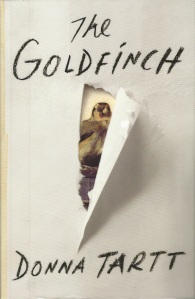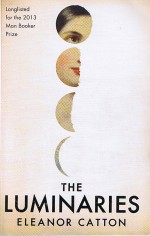A friend (A… ) and I had a conversation recently about two prizewinning books, The Goldfinch by Donna Tartt, and The Luminaries by Eleanor Catton. Both are long, in the region of 800 pages. Both have won major prizes this year: The Goldfinch won the Pulitzer Prize for Fiction; The Luminaries won the Man Booker.
I really liked The Luminaries, and wrote about it here. A… didn’t like it at all, found the characters unmemorable and the story repetitive – it ended back where it had begun, she said, reprising what was told in the beginning. The most positive thing she said about it was that she learnt a bit about gold-mining.
I didn’t take to the protagonist in The Goldfinch, found the descriptions of both settings and drug use overdone to the point of tediousness and thought it redeemed only by some interesting discussion near the end about the endurance of art (as distinct from a human life) and how it can make us see beauty in the world where we hadn’t seen it before. On the other hand A… thought it was a terrific, widely-encompassing book with a number of compelling scenes that endured well beyond the reading.
 We both read a lot. I respect A…’s opinions (she has taught English literature, I have not). We neither of us changed our opinions about the books.
We both read a lot. I respect A…’s opinions (she has taught English literature, I have not). We neither of us changed our opinions about the books.
The conversation reminded me of times when I have felt like a minority opinion in liking – or not – a film/ book/ television show that everyone around me had an opposing view of. What I really liked, though, was that talking about why I admired one book and not the other with someone who disagreed made me articulate what I based my opinion on. That happens when my partner Prue and I talk about a book we have both read, too. And it’s one of the things I like about being in a book group.
Talking about books can be just about as much fun as reading them.

